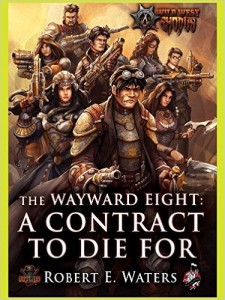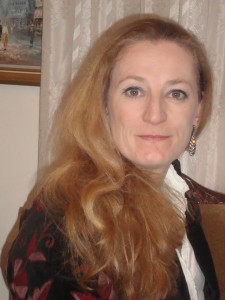Today, let’s welcome another fascinating author, TJ Perkins, who has a story appearing in the soon-to-be-released anthology Dark Luminous Wings.
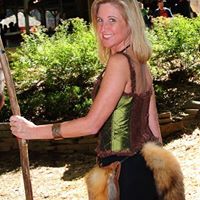 TJ is a gifted and well-respected author in the mystery/suspense genre, but she recently expanded into the world of fantasy for teens. She wrote the Shadow Legacy series, a unique crossing of the fantasy and manga genres. Her short stories for young readers have appeared in the Ohio State 6th Grade Proficiency Test Preparation Book, Kid’s Highway Magazine, and the webzine “New Works Review.” TJ’s book Four Little Witches won the 2016 Coalition of Visionary Resources (COVR) Visionary Art Award. She’s been published in the Who’s Who in America. Her mystery/suspense books for kids are Wound Too Tight, Mystery of the Attic, and On Forbidden Ground. Articles on TJ Perkins have appeared in the Carroll County Times, Chartley Chatter, Maryland Family Magazine and The Community Times. She’s been interviewed on WTTR radio. She’s made many trips to elementary and middle schools to talk about her books. Her biggest seller, Mystery of the Attic, has been made into a play, brought to life by the Cafe Theater Company in Brick, NJ.
TJ is a gifted and well-respected author in the mystery/suspense genre, but she recently expanded into the world of fantasy for teens. She wrote the Shadow Legacy series, a unique crossing of the fantasy and manga genres. Her short stories for young readers have appeared in the Ohio State 6th Grade Proficiency Test Preparation Book, Kid’s Highway Magazine, and the webzine “New Works Review.” TJ’s book Four Little Witches won the 2016 Coalition of Visionary Resources (COVR) Visionary Art Award. She’s been published in the Who’s Who in America. Her mystery/suspense books for kids are Wound Too Tight, Mystery of the Attic, and On Forbidden Ground. Articles on TJ Perkins have appeared in the Carroll County Times, Chartley Chatter, Maryland Family Magazine and The Community Times. She’s been interviewed on WTTR radio. She’s made many trips to elementary and middle schools to talk about her books. Her biggest seller, Mystery of the Attic, has been made into a play, brought to life by the Cafe Theater Company in Brick, NJ.
Let’s get to the interview:
Poseidon’s Scribe: How did you get started writing? What prompted you?
TJ Perkins: I discovered a love for storytelling when I was a little girl going to sleepover parties. We would pass the flashlight and add-on to a story. When it got to me, I made the story creepy and the girls just wanted me to keep telling the story. By the time I was in middle and high school I was on a roll; getting straight A’s in creative writing and English class. In my late 20’s I got a computer and never stopped writing. My story Mystery of the Attic is based on a very scary thing that happened to me as a young teen; I never forgot it and had to write it down. It became my biggest seller.
What prompted me? My grandfather (on my dad’s side). He would tell spooky stories at the dinner table and I would listen, captured by every word.
P.S.: Who are some of your influences? What are a few of your favorite books?
TJ: My favorite authors are Agatha Christie, Sir Arthur Conan Doyle and Maria V. Snyder. My favorite book of all time is The Three Musketeers.
P.S.: Primarily, you write mystery, suspense, and fantasy. What attracted you to these genres?
TJ: I fell in love with spooky storytelling because of my grandfather. I started going to Renaissance Festivals, fell in love with dragons, fairies and mystical realms, and then discovered fantasy books by Maria V. Snyder. Now all of my fantasy stories have an element of mystery to them and readers love it!
P.S.: Most of your books are for teens and young adults. What is different about writing for that audience compared to writing for adults, and how do you know what stories will work with that age group?
TJ: Kids are just as critical with the books they read as adults are. If they don’t like something, they will sure let you know in no uncertain terms – and they spread the word real fast. But young people are also fun to write for, offering more of an open, playful mind ready to be challenged and plunged into exotic worlds. Adults are exhausted, stressed out, they don’t have a whole lot of free time and most feel they’re seen movies or read books that have shown them pretty much all there is. They want something different, which makes them a more difficult audience. Bottom line is – you don’t know what will work. You just tell the best story you can and hope for the best.
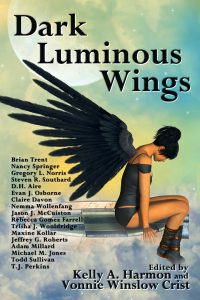 P.S.: Your story, “The Sapphire Circle” appears in the upcoming anthology Dark Luminous Wings. Please tell us about the main character in that story.
P.S.: Your story, “The Sapphire Circle” appears in the upcoming anthology Dark Luminous Wings. Please tell us about the main character in that story.
TJ: The main character, Nick, is my son; making mistakes and doing stupid things as a young man. But he develops more of an adult mentality and wants to help society, rather than hurt. To me this personifies most young people in their early 20’s, doing dumb stuff, then something snaps in their minds and they change, start to figure things out and develop a sense of who they are.
P.S.: What are the easiest, and the most difficult, aspects of writing for you?
TJ: The hardest parts are starting or ending a story and staying in the character’s heads. The easiest is developing the characters and world.
P.S.: Since you first began writing, how has your writing evolved in terms of style, theme, genre, etc.?
TJ: My kids were the basis of what it was that I wrote. When they were little, I started off writing mysteries for YA readers, going for the clean, non-violent stories. Then I realized that bad guys today wouldn’t just give up if caught; they would put up a fight. So, I added in some sort of a struggle to catch the bad guys. As my kids grew older, our love of video games and anime helped me create the Shadow Legacy series. When I became Wiccan it helped shape many of the themes in my stories for older readers and even my picture book Four Little Witches that won the COVR Visionary Art Award. In a nut shell – I grew older, wiser and evolved as a person and it helped shape my writing.
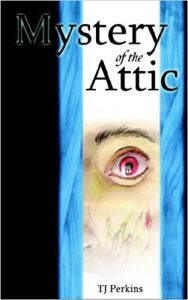 P.S.: Your book Mystery of the Attic was adapted into a play. That sounds like a fantastic honor. How did that come about, and what was it like for you to see your story performed on stage?
P.S.: Your book Mystery of the Attic was adapted into a play. That sounds like a fantastic honor. How did that come about, and what was it like for you to see your story performed on stage?
TJ: I was actually soliciting my mystery books for all sorts of venues. Thinking out of the box, I presented Mystery of the Attic to be a play and a theme for an amusement park ride since it was one of my most popular books and biggest seller at the time. Only one children’s theater in New Jersey accepted. It was amazing to see the kids act it out perfectly. It was even more amazing to see the kids in the audience get so quiet you could hear a pin drop while they were watching it. That play helped spike sales for several weeks afterwards.
P.S.: Your recent Shadow Legacy series sounds fascinating. Please describe the ‘world’ and premise of this series, and the protagonist.
TJ: The world is actually modern day Japan, but with a twist. There’s a village where past marries present day and they produce the finest assassins in the world. All countries have their own version of ninja, but nothing like the Chaio (means fire). Duncan’s parents died when he was very young and he was raised by his uncle. Duncan has an entity inside of him and it’s triggered by his teen anger. It uses that anger to grow stronger and tries to take over, but Duncan needs to understand what it is and learn to meld with it to stop the growing threat of a mysterious dark ninja magic that binds the user with a demon. Plagued with all the issues a teen becoming a young man has to deal with, learning all new powers, honing existing skills, keeping control of a inner power with a mind of its own and trying to save the world is way more than a teen should have to deal with – but that’s Duncan.
P.S.: You’ve achieved marketing success other writers dream about, with articles written about you, interviews on radio, and appearances at schools, etc. For those of my blog readers who are beginning writers, please discuss the importance of these activities.
TJ: You have to stay in the public eye any chance you get. Attending Cons, speaking on panels, and promoting are essential. If you don’t toot your own horn, no one else will and no one will know your book exists. YOU have to be the one to promote and market your book in as many ways as possible. Even if you get picked up by a large publisher YOU still have to be the one. Can it be made into a play? If yes, then send out emails to theater groups. Can it be produced on Broadway? Can it be turned into an amusement park ride? Are you skilled enough to conduct writing workshops? Do mailings to all schools to let them know your book is ready for purchase or to have you in.
P.S.: What is your current work in progress? Would you mind telling us a little about it?
TJ: My current work is a three-book story called Runes & Relics. This is high fantasy unlike anything anyone has done before. It has a strong female protagonist, a vicious love triangle and, of course, the fate of the world resting on her ability to control the elements and bring balance to her world. Only one of the men she loves can exist in the world at the same time, and she must decide which one – and kill the other. Her choice will set the stage for her future. Every decision she makes brings change to the world, either good or bad, bringing balance or allowing chaos to continue to unfold.
Book One is complete and in the hands of Tor. I’m working on Book Two.
Poseidon’s Scribe: What advice can you offer to aspiring writers?
TJ Perkins: Take writing classes and learn how to write your story perfectly. The biggest mistake I see is that new writers do not know how to ‘show’ their story unfolding on the pages. They simply ‘tell’ it. Get an editor or ask people on Facebook to be beta readers – and they must be brutally honest. Also, get thick skin, (learn to take criticism), but mostly don’t give up.
Thank you, TJ! My readers can find out more about TJ here, at her Amazon author page, on Facebook, and Twitter.
Poseidon’s Scribe

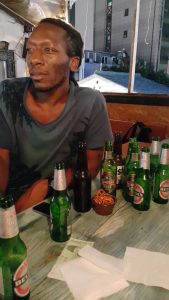

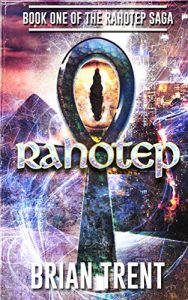
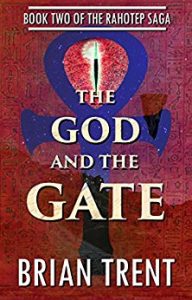


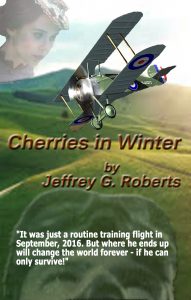
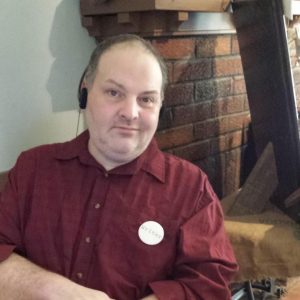
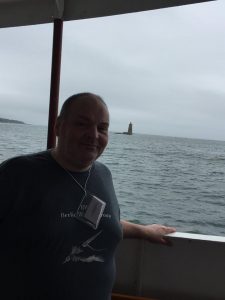
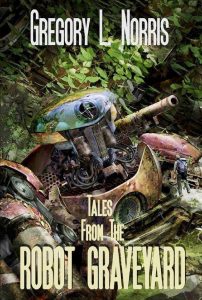
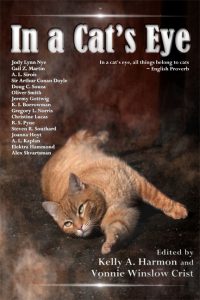
![Pageflex Persona [document: PRS0000039_00001]](https://stevenrsouthard.com/wp-content/uploads/2015/10/HidesTheDarkTower-DigitalCover-FINAL2-200x300.jpg)


